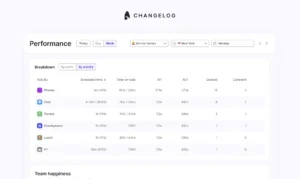
Scaling a customer support team in 4 steps

Scaling a customer support team often comes out of necessity, rather than as a planned strategic initiative. In this blog, we explain how to scale a customer support team in detail, in 4 clear steps.
Scaling a customer support team
Scaling a customer support team is not a walk in the park. Hiring takes a long time, training is time consuming and costly, metrics change at different stages of growth, businesses grow in complexity and customer service needs to resist adding that complexity in their function.
With success and growth comes more customers. More customers brings with it the need to quickly onboard and train new employees within the support team, to keep up with the needs of these new customers.
Explosive growth can be disastrous for metrics like customer satisfaction scores (CSAT) and Net Promoter Score (NPS) if a customer support team isn’t carefully considered in strategic planning. We’ve written about CSAT and NPS in a previous blog. To avoid this, and to successfully scale a customer support team, organisations need to follow the following 4 steps.
1. Customer support automation
Before we get into the details of how to scale a customer support team using automation, it’s important to understand what automation means. Automation doesn’t just mean automating conversations and how you respond to tickets. Take this quote from Intercom, for example: “there is more to scaling up than just machine learning and bots.”
It’s arguably more so about the human support work that goes on behind the scenes. According to Ultimate AI, 60% of agent work happens outside conversations with customers. These include back-end processes to fix customer accounts, identify necessary context to solve a problem and track statuses. These are crucial but repetitive tasks, making them great opportunities for automation to work effectively to enable agents, not replace them.
Once processes are standardised and formalised, they can be automated to improve an agent’s ability to provide great customer care.
2. Motivate your support team with the right incentives
Incentives are critical to get right. Managing the trade off between motivating your team to do their best work, keeping quality consistent but also ensuring you meet your Service Level Agreement and delight customers with quick responses is not an easy task. Some companies tend to use lots of unnecessary metrics when it comes to evaluating what good support looks like.
We see it as more simple than that: “Figure out your objectives, and tie your metrics to that. Don’t just pull all available data because it’s there.” Decide what the objective of your customer support team is, and choose metrics based upon that. Read more about how to incentivise your team in our free eBook.
3. Get support team hiring right
The most important aspect of your support team is of course, the people. Hiring and training the right people is crucial if you want to scale your support team. Two important traits for new hires in customer support teams, according to seasoned support leader Shamaz Aziz, is that they can solve problems quickly, and they can learn about a product portfolio or service offering in sufficient detail to understand the intricacies of it.
When a support team begins to scale, you’ll have to admit that you can’t go through each application with a fine-toothed comb, or conduct every prospective candidate interview. One useful course of action can be to test support team candidate skills using assessment centres that replicate a customer support centre as closely as possible. Prospective team members work with others in a simulated environment to test how they respond to stressful situations and how they use reason and logic.
4. Invest in customer support software
Investment in better customer support software is essential if you are looking to scale your support team. We recommend scaling teams adopt workforce management software as early as possible. However, we don’t mean traditional workforce management platforms that monitor, track, and ultimately disillusion employees. We’re talking about platforms like Dixa that empower employees to excel in their role with powerful features like knowledge base, or customer chat automation tools like intercom.
When tools are used to enable agent empowerment, it has a lasting impact on the happiness of employees, and the successful scaling of the support team as a whole.
Putting your support team first
Among all the considerations detailed above, it’s crucially important that the experience your team members have at work remain top of mind. Automation, incentives, training, and software are all undeniably important elements to consider when scaling your customer support team. However, a support team full of empowered employees who have the autonomy to make decisions that ultimately benefit customers is the ultimate goal.
Regardless of how large your team grows, the constant that should remain is ensuring your support team is empowered, included, and happy.
At Surfboard, our mission is to be the place where support teams come together. We’re looking to accomplish this mission by allowing customer support teams to collaboratively plan together with detailed forecasting, shift planning, and activity scheduling. Also, our Surfer Team View feature allows every member of a support team to see what the team is working on, increasing visibility within the team. Read more about it here.



